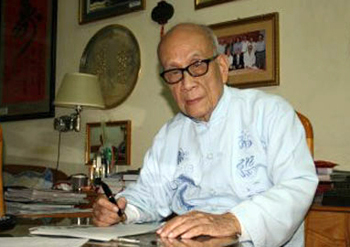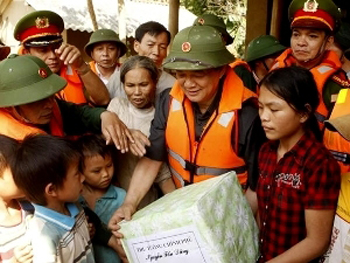A well-known prof. talks of power and responsibility of Gov’t and PM
VGP – The following is an interview between VGP and Prof. Vũ Khiêu about socio-economic achievements and weaknesses of Việt Nam, as well as power and responsibility of the Government and the PM.
Reporter (R): Would you like to give us some
comments on Việt

Prof. Vũ Khiêu (Prof.): I am pleased with recent
achievements of our country. Generally, I agree with the report presented by
the PM at the National Assembly sitting session. The report highlights our
country’s achievements while pointing out weaknesses in management work. The
report was thoroughly considered by NA deputies and many of them raised
questions for the Cabinet members, from the PM, Deputy PMs to leaders of
ministries and State agencies. Though some deputies stressed shortcomings and
weaknesses relating to the Government’s performance, the majority of them recognized
fundamental results gained by the Government.
R: What is your assessment of the performance
of the Government and the State apparatus as a whole?
Prof.: The Government’s performance is in line with the interrelationship of the Party’s leadership, State’s management and people’s mastership. Thus, it is possible to say that the Government’s performance is also the outcomes of the close relationship between the Government and the Part, between the Government and the people. Nowadays, in managing the country, the PM takes the major responsibility and he is also a member of the Party’s Politburo. This is an advantage which helps the PM maintain regular contacts with the Politburo and easily collect and make use of the Politburo’s common opinions. Conversely, the Politburo can also have an insight in the Government’s operations. So, the Government’s achievements are also those of the Party, and the Government’s responsibility is closely attached to the Party’s.
R: How do you evaluate the PM’s
performance?

Prof.: Sorry, I can’t do that because I
don’t know the PM’s daily activities. Only the Party and State agencies at all
echelons which have direct contacts to the PM will make accurate assessment. However,
in my opinions, the PM takes the top responsibility for the Government’s
performance, so the Government’s success or failure must be attributed to the
PM, first and foremost.
To assess a State or one of
heads of state, it is necessary to base on the two following criteria:
1. To the country: What they do to promote the national development?
2. To people: What they do to bring well-being,
freedom and happiness to people?
To meet these criteria, we
should follow President Hồ Chí Minh’s teaching: “Loyal to the country,
dutiful to people, complete all assignments, overcome all difficulties, and
defeat all enemies.”
I strong believe that the
PM never forgets Uncle Hồ’s teaching. However, the PM’s performance is not easy.
Some NA deputy questioned why the PM does not dismiss his inferiors who commit
wrongdoings. I think that the Japanese PM can do that thanks to
|
|
R: Does PM Nguyễn Tấn Dũng meet
all requirements as taught by Uncle Hồ?
Prof.: In 2010, Việt
Over the past time, watching
external activities on TV, we can recognize PM Nguyễn Tấn Dũng’s active role
and dignity in front of any head of states or well-known politicians of the
world, showcasing Việt
R: Thank you very much.
